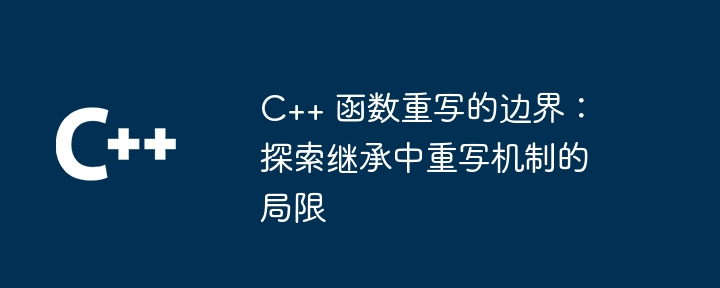
In C, function rewriting is subject to the following restrictions: 1. Constructors and destructors cannot be overridden; 2. The access permissions of the overriding function must be the same as or more relaxed than the base class; 3. The parameters of the overriding function The list and return value types must be consistent with the base class; 4. Static functions cannot be overridden.

The Bounds of C Function Overriding: Exploring the Limits of the Overriding Mechanism in Inheritance
In C, function overriding is A powerful technique that allows functions in a base class to be redefined in a derived class, thereby providing customized behavior to inherited code. However, function overriding is also subject to certain limitations, and understanding these limitations is critical to writing robust and maintainable code.
Limitations 1: Constructors and destructors cannot be overridden
Constructors and destructors are the only functions that cannot be overridden in derived classes. This is because these functions are responsible for the lifetime management of the object, and allowing them to be overridden would undermine the robustness of the language.
Limitation 2: Restrictions on access permissions
The overridden function must have the same or looser access permissions as the base class function. For example, if a base class function is protected, a derived class function cannot be private.
Limitation 3: Unable to change parameters or return value types
The overridden function must have the same parameter list and return value type as the base class function. This ensures that derived class methods maintain compatibility with base classes.
Limitation 4: Static functions cannot be overridden
static functions are not associated with a specific object, so they cannot be overridden in derived classes. Calls to static functions always resolve to the base class implementation.
Practical Case
Let us consider the following example:
class Base {
public:
void draw() {
// 绘制基类形状
}
};
class Derived : public Base {
public:
void draw() override {
// 绘制派生类形状
}
};In this case, we can successfully override the draw() function, Because derived class functions comply with overriding restrictions. It has the same access rights, parameter list, and return value type.
Conclusion
Understanding the boundaries of C function rewriting is critical to writing robust and maintainable code. Understanding these restrictions can avoid errors, ensure that derived class methods remain compatible with the base class, and avoid unexpected behavior.
The above is the detailed content of The Boundaries of C++ Function Overriding: Exploring the Limits of Overriding Mechanisms in Inheritance. For more information, please follow other related articles on the PHP Chinese website!
 What are the differences between c++ and c language
What are the differences between c++ and c language
 Recommended learning order for c++ and python
Recommended learning order for c++ and python
 Cost-effectiveness analysis of learning python and c++
Cost-effectiveness analysis of learning python and c++
 Is c language the same as c++?
Is c language the same as c++?
 Which is better to learn first, c language or c++?
Which is better to learn first, c language or c++?
 The difference and connection between c language and c++
The difference and connection between c language and c++
 C++ software Chinese change tutorial
C++ software Chinese change tutorial
 Cost-effectiveness analysis of learning python, java and c++
Cost-effectiveness analysis of learning python, java and c++




